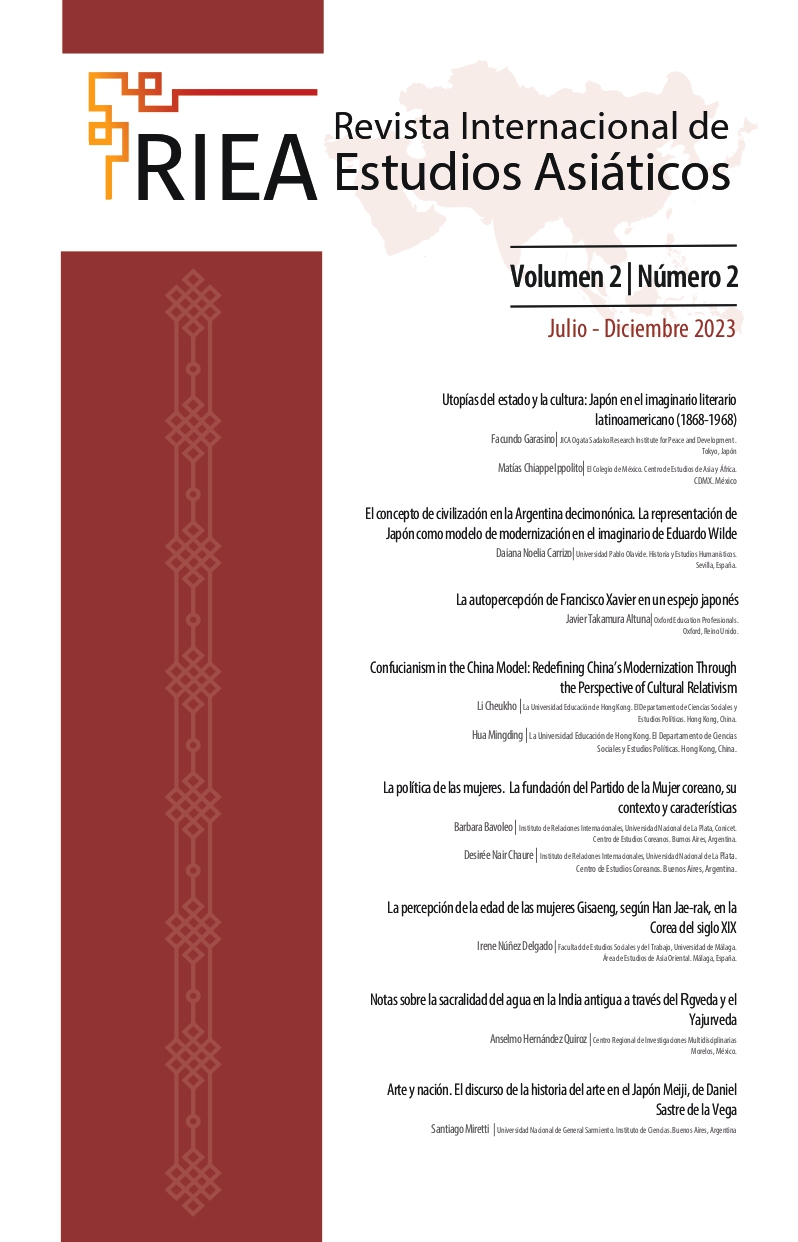Abstract
I inquire here into the water’s symbolism in the R̥g Veda and Yajur Veda texts –and in their brāhmaṇa exegetical tradition– through a study limited in time, but extended to the different water bodies mentioned in the Veda (ocean, sea, river, etc.), in addition to the phenomena associated (rain, waves, currents, etc.). The hypothesis is that the water’s symbolic image has in common, with respect to its counterpart the water’s natural image, the idea of flowing, vivifying and purifying. However, the water’s symbolic description as a divine entity consists of metaphors that go beyond the water’s natural image. I consider that outlining the similarities and differences between the water’s natural image and the symbolic one will allow us to better understand the vision of the Vedic poets. In addition to the poetic resources (figures of thought), linguistic (figures of speech) and hermeneutic (interpretative modes) resources will be studied.
References
Fuentes primarias
Eggeling, Julius (ed.) The Śatapatha Brāhmaṇa. Oxford: Clarendon Press, 1963.
Keith, A. B. (ed.). Rigveda Brahmanas: The Aitareya and Kauṣītaki Brāhmaṇa of the Rigveda. Cambridge: Harvard University Press, 1920.
Keith, A. B. (ed.). The Veda of the Black Yajus School: Taittirīya Saṁhitā. Delhi: Motilal Banarsidass, 1967.
Pratap, Surendra (ed.). The Yajur-Veda-Saṁhitā (Vājasaneyi-Mādhyandina-Śukla). Basado en la traducción de Ralph T. H. Griffith. Delhi: Nag Publishers, 1990.
Ranade, H. G. (ed.). Kātyāyana Śrauta Sūtra. Puna: Decan College, 1978.
Thomson, Karen y Slocum, Jonathan (eds.). The Rigveda: Metrically Restored Text. Versión electrónica basada en la edición de van Nooten y Holland (Cambridge: Harvard University Press, 1994). Accedido 15 de enero de 2022. https://www.utexas.edu/cola/centers/lrc/RV/RV00.html.
Fuentes secundarias
Baartmans, Frans. Apah, the Sacred Waters, An analysis of a primordial symbol in Hindhu Myths. Delhi: B. R. Publishings, 1990.
Beuchot, Maurice. Tratado de hermenéutica analógica: Hacia un nuevo modelo de interpretación. Ciudad de México: Ítaca, 2000.
Findly, Ellison Banks. “The ‘Child of the Waters’: A Revaluation of Vedic Apāṃ Napāt”. Numen 26, n.˚ 2 (1979): 164-184.
Gonda, Jan. The functions and significance of gold in the Veda. Leiden: E. J. Brill, 1991.
Gonda, Jan. Les Religions de L’Inde I: Vedism et Hindouisme ancien. Paris: Payot, 1962.
Hillebrandt, Alfred. Vedic Mythology (Volúmenes 1 y 2). Traducción del alemán por Sreeramula Rajeswara Sarma. Delhi: Motilal Banarsidass, 1980.
Jamme, Christoph. Introducción a la filosofía del mito en la época moderna y contemporánea. Barcelona: Paidós, 1999.
Lahiri, Ajoy Kumar. Vedic Vṛtra. Delhi: Motilal Banarsidass, 1984.
Macdonell, A. A. Vedic Mythology. Delhi: Motilal Banarsidass, 1981.
Mahadevan, Thennilapuram P. “The Ṛṣi index of the Vedic Anukramaṇī system and the Pravara lists: Toward a Pre-history of the Brahmans”. Electronic Journal of Vedic Studies, 18-2 (2011): 1-139. http://www.ejvs.laurasianacademy.com/anukramani.pdf.
Matas, Enrique Aguilar. 1991. R̥gvedic society. Leiden: E. J. Brill.
Oberlies, Thomas. 1998. Die Religion des Ṛgveda: Erster Teil: „Das religiöse System des Ṛgveda“. Wien: Institut für Indologie der Universität Wien.
Panikkar, Raimundo. The Vedic experience: Mantramañjarī. Delhi: Motilal Banarsidass, 1977.
Renou, Louis. Religions of Ancient India. London: The Athlone Press, 1953.
Staal, Frits. Discovering the Vedas: Origins, Mantras, Rituals, Insights. Amsterdam: Penguin, 2009.
Yelle, A. Robert. Explaining Mantras. Ritual, Rhetoric, and the Dream of a Natural Language in Hindu Tantra. Nueva York / Londres: Routledge, 2003.

